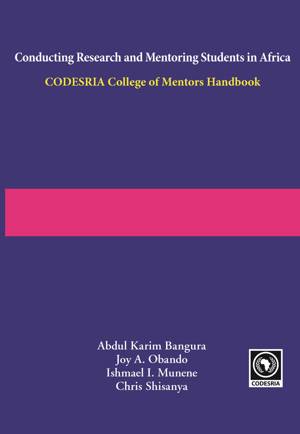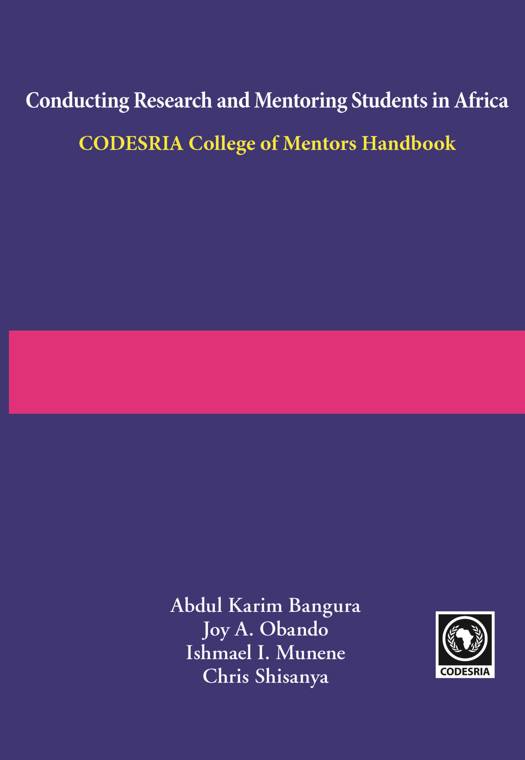
- Retrait gratuit dans votre magasin Club
- 7.000.000 titres dans notre catalogue
- Payer en toute sécurité
- Toujours un magasin près de chez vous
- Retrait gratuit dans votre magasin Club
- 7.000.0000 titres dans notre catalogue
- Payer en toute sécurité
- Toujours un magasin près de chez vous
Conducting research and mentoring students in Africa EBOOK
Abdul Karim Bangura, Joy A. Obando, Ishmael I. Munene, Chris Shisanya
Ebook | Anglais
6,49 €
+ 6 points
Description
This book is an outgrowth of the inaugural session of the Council for the Development of Social Research in Africa (CODESRIA) College of Mentors Institute convened at Kenyatta University in Nairobi, Kenya from 10 to 20 April, 2017. The authors of the book comprise the resource persons and 49 very competitively selected doctoral candidates from across Africa that participated in the Institute. The impetus for the book was the desire to develop a tool that is suitable for conducting research and mentoring students in Africa that other doctoral candidates, other writers, and mentors can use in their pursuits. The College of Mentors is a part of the activities of CODESRIA's African Diaspora Support to African Universities program. The College is composed of senior academics from the Diaspora and within Africa in higher education, the humanities and social sciences. This component entails linking selected PhD candidates and their supervisors to mentors for purposes of benefiting the candidates in their PhD progress. The mentors are expected to offer advice regarding relevant literature, read and comment on draft chapters of theses in preparation, liaise with the official advisors of the doctoral candidates based at African universities and share their views about the work of the students; and where possible, invite and host the students and the official advisors as visiting scholars. The mentors may also be requested to run various activities under this program such as institutes, research methodology workshops and research networks. A joint workshop of the selected students, their supervisors and mentors are held at the beginning to agree on working modalities. The College seeks to both complement and strengthen the support in capacity building in African universities in which CODESRIA is engaged through the Small Grants Programme for Thesis Writing, the institutes, and the methodology workshops. CODESRIA's African Diaspora Support to African Universities seeks to mobilize African academics in the Diaspora to contribute to the strengthening of African universities, the nurturing of new generations of scholars in Africa in a culture of excellence, and the revitalization of the social sciences, higher education studies, and the humanities. The specific objectives of the initiative include the strengthening of PhD programs and the curricula in the social sciences and the humanities (SSH); contribute to the filling of gaps and dealing with shortages in teaching; mentoring of young social science scholars in Africa, more generally; as well as in strengthening relations between African academics in the Diaspora and the institutions where they are based and African universities. The initiative derives from CODESRIA's mandate as the leading Pan-African social science council of the continent and its responsibility to help address the problem of the shortage of qualified academic staff in many African universities both for teaching and for PhD supervision. This problem has worsened with the creation of hundreds of new public and private universities. The consequences of these shortages include the lack of capacity in most of the social science and humanities departments and schools in African universities to organize quality postgraduate programs and conduct research. In some instances, capacity for postgraduate supervision does not exist, and doctoral and masters students take longer to complete their programs due to a lack or shortage of qualified supervisors and mentors. On the other hand, the existence of a large African academic Diaspora has been documented in numerous studies. Many of these scholars are willing to lend a hand in the revitalization of universities in their home countries or elsewhere in Africa. Other highly qualified academics are circulating outside the universities, within Africa itself, and it would be important to have an initiative that taps into the knowledge and skills they have. Therefore, one effective way to address the shortage of qualified senior academic staff and PhD supervision capacity in African universities is to mobilize the academic Diaspora to support universities in Africa.
Spécifications
Parties prenantes
- Auteur(s) :
- Editeur:
Contenu
- Nombre de pages :
- 1143
- Langue:
- Anglais
Caractéristiques
- EAN:
- 9782382340691
- Date de parution :
- 03-05-22
- Format:
- Ebook
- Protection digitale:
- Digital watermarking
- Format numérique:
- ePub

Les avis
Nous publions uniquement les avis qui respectent les conditions requises. Consultez nos conditions pour les avis.






